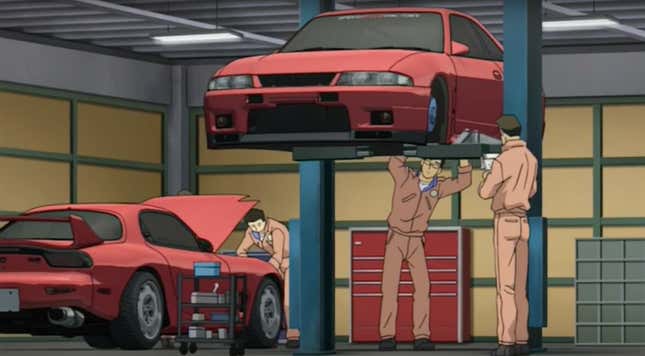
The 26-episode anime series Wangan Midnight is ostensibly about Japanese street racers, wrenching, and a Datsun Z that may or may not be demonically possessed. It sounds wacky but somehow the show’s final message ends up feeling a lot more mature than what I’ve seen in any other show or movie about cars.
Wangan Midnight was a Japanese manga comic that came out in the ’90s; it’s also been a video game a few times and a live-action feature film came out in 2009. The short-lived cartoon, which was new in 2007, is the version I like best, though.
The premise and characters are pretty much the same in each version of the story: there’s an underground car scene in Tokyo where people illegally race each other on the Wangan highway in the middle of the night. There’s a young kid who kind of inherits an improbably powerful old Z car. There are other racers battling for top speed supremacy, and a whole industry of tuner shops dialing the cars in.
The concept is loosely based on real life.

Anyway, after binging all 26 25ish-minute animated episodes over the last week, I realized my enthusiasm for tuner cars had been reignited in a huge way. But more surprisingly, I felt really good about myself. Almost like a little piece of my faith in humanity had come back.
What makes Wangan Midnight is so deeply satisfying to watch is the self-awareness of its characters, and the message of mutual respect that ties the whole show together in the final episode.
Over the course of the series, all the racers are constantly adding modifications to one-up each other, and most episodes create scenes of very tense and tight rivalries between them through high-speed races in traffic over a eurobeat soundtrack. But then the rival racers also have coffee together, ride in each other’s cars to compare notes, and they even use the same tuners to mod their cars.

The racers, most of them wealthy people (they would have to be, to be able to afford the bonkers upgrades they put on their cars), all get their own soliloquies that pretty much hit the theme of: “this hobby is illogical and irresponsible, yet I am addicted to it.”
That, to me, feels much more earnest and realistic than anything that comes through in the new Fast and Furious flicks (“we gotta drive the cars to save the world!”) or car restoration reality shows (“we gotta get this build done tomorrow to save the world!”).
And the last episode of Wangan Midnight is the sweetest cherry-on-top conclusion of any fictionalized piece of car culture, as far as I’m concerned.
Three main characters are having the final battle in their cars, of course. A Porsche 911, Mazda RX-7 and Datsun Z are all charging down the highway at high speed to figure out once and for all who is the fastest on the Wangan–pretty standard fare so far.
While this is going on the engine tuners, panel beaters and mechanics are all talking about the fact that they all worked on each of the cars, acknowledging that even the last contest was really just a friendly competition to see which automotive platform came out the best.
And in the end–the racers don’t push beyond their limits; there is no dramatic crash or in-your-face shaming of the defeated. The two slightly slower cars just realize that they are slightly slower, and back off, with all parties concerned unanimously, but not begrudgingly, accepting a winner.

Wangan Midnight understands that we, as car fans, have passions that can’t be explained or justified. But more importantly, the show has a message that mutual passion can bridge a gap of respect between rivals. It’s not about saving the world, it’s not about drama for the sake of drama, it’s all about the cars.